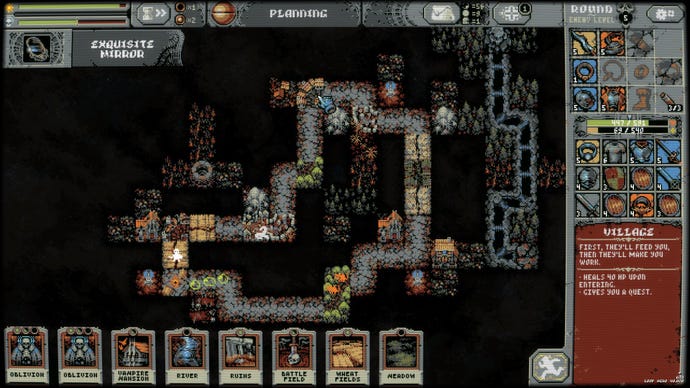[ad_1]
Videogames are full of loops. Often, the loop isn’t just a loop in space but a loop of labour, a loop in time. It’s a repeated task with a touch of variation from cycle to cycle, typically associated with a character progression system of some kind. The classic one is the town-dungeon loop in an action-RPG such as Diablo 4. You sally forth into the depths with sword and shield, slaughter a bunch of blameless goblins, then orbit triumphantly back to the village square with its 24/7 forge and bustling adventurer’s guild. Then off you go, once again, with a Sword +1 and a shield now bearing a Goblin Magnet. There are straightforward equivalents in multiplayer, especially in the wake of Call Of Duty 4: Modern Warfare – sign in, play a few matches, harvest some XP, unlock a new laser sight, equip it, play a few more matches with +5% to your aim.
These loops of task and reward are very often beautifully wrought and engrossing to think about. Take Overwatch, or at least, the game that used to be Overwatch: here, the loop registers at the level of the soundtrack. I’ve always loved how Overwatch’s boisterous lobby theme psychs you up and keeps you flowing from round to round. It gets going while you’re picking characters and spills over into the saferoom, crests once again when the shooting begins, builds to one last high during the closing Play of the Game and melts away… before winding back up again. It’s such an elegant structure, and such fun, constantly cheering you onto the next match. But this kind of loop can also, of course, be numbing, reductive and predatory. It’s a habit-forming device that corrodes the act of play to a kind of commute, and makes you more amenable to reward structures that may overlap with microtransaction systems in the like. In short, the loop can be a snare.
Which makes me very keen on games that implement loops in a more critical way. An obvious one is Loop Hero, an exotic reinterpretation of the roguelike or roguelite – the loopiest of videogame genres, in which the town-dungeon loop is a ritual of incarnation, or rather of procedural generation, spinning up a slightly different world each time. Loop Hero surfaces that ritual for the player by having you piece together the map as you traipse along a single, circular path, earning resources from the initial encounters you can spend on terrain tiles that spawn fresh hazards, resources and alchemical possibilities, even as you enhance your questing hero to suit.
In theory, it’s as draining and deadening as some of the more openly exploitative, compulsive reward-loops you get in RPGs that feature a lot of monetisation, but the key thing is that Loop Hero is transparent about it, and structurally available to participation in a way many games aren’t. The loop is a top-down pixelart toy you can pore over and meddle with. It’s something you can redesign, optimise or render inoperable by plonking down too many spider cocoons or what-have-you at the final turn. Rather than entwining you in its coils, the designers offer the loop up to you as a tool for thinking with.

Still, it doesn’t have the grandeur of the loop you get in Roadwarden (beware minor spoilers ahead). I’ve sung the praises of that game’s approach to magic and money, now let me gush over the cleverness of its world map, which broadly consists, again, of a single, circular path. It takes you a while to realise the loop is there, because you must reveal Roadwarden’s map section by section. Once you do, it takes you a little longer to realise that, for all the game’s aversion to grinding and busywork, there are cunning traces of Diablo to its design. There are earning opportunities at carefully spaced intervals: a river where you can place a net, for example, returning to it on the next circuit to collect fish for sale elsewhere. This earning process never becomes Roadwarden’s core drive, but still – I was quietly tickled to learn that what seems, at first, to be a bulkier specimen of visual novel does, in fact, have a certain amount in common with looty game-as-a-service RPGs.
Roadwarden’s loop surrounds a wilderness, a festering blank roamed by deadly mythical creatures, devoid of settlements and with no clear way through. It makes for a setting that is vivid and densely imagined but also eerily vacuous and resistant to the eye, a centrifugal geography with a heart of darkness (yes, this is in large part a story about imperialism and colonialism). Even when you try to venture into the wilds, you’re only shown one region at a time, flipping between them like pages. The area always appears impenetrable from without.

Roadwarden’s creator, Aureus of Moral Anxiety, told me earlier in the year that “I wanted to have this void in the middle and have you pushed to the sides”. As the self-contradictory account of a “void” that “pushes you to the sides” suggests, the wilderness is at once repellent and inviting. At first, you’re lured to it by what it might harbour – vanished adventurers and legendary bandits, giant cats and dragons. But as you master Roadwarden’s loop, and winter draws near, the greater incentive to visit the wilderness becomes that most Diablo of emotions, efficiency. Discover the path to the other side, gather all the knowledge and equipment you need for the journey, and you can save precious hours as the endgame approaches. Part of Roadwarden’s genius, in other words, is that it gives you yet another videogame loop and then slowly, gracefully encourages you to cut across it.
fbq('track', 'PageView'); window.facebookPixelsDone = true;
window.dispatchEvent(new Event('BrockmanFacebookPixelsEnabled')); }
window.addEventListener('BrockmanTargetingCookiesAllowed', appendFacebookPixels);
[ad_2]
